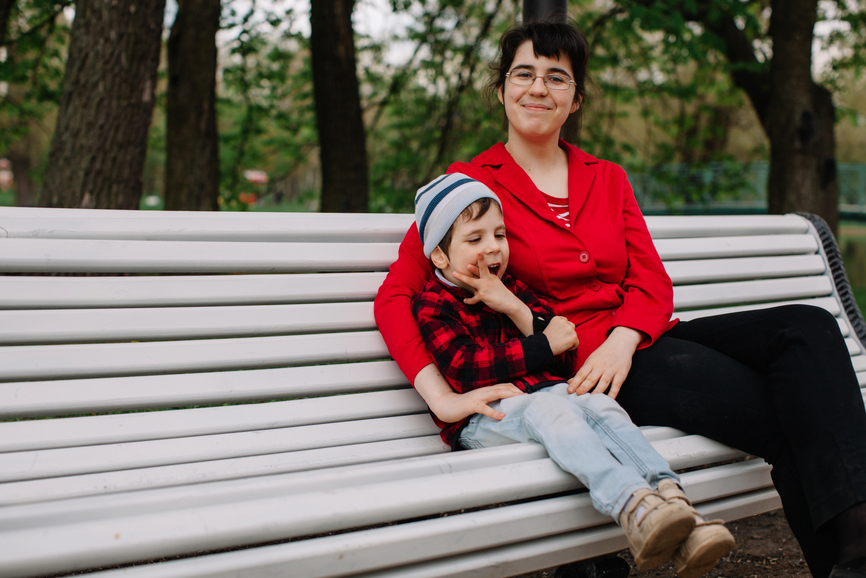Carers are people who provide unpaid care and support to family members and friends who have a disability, mental health condition, chronic condition, terminal illness, an alcohol or other drug issue or who are frail aged – anyone at any time can become a carer.
Our interviewees manage their careers alongside caring for family members with disabilities, fostering children, partners with chronic illness and supporting ageing family members.
Samara Dobbins, Deputy Secretary, People & Operations at Department of Premier and Cabinet (NSW) explained how she found out about her daughter’s diagnosis with Williams Syndrome:
“I kept taking her to the local GP and they kept making me do the post natal depression test. I knew I wasn’t depressed. I felt like there was something not right about my baby.
Eventually, she was diagnosed with Williams Syndrome. It’s a fascinating syndrome. They call it the cocktail party syndrome. She is missing elastin, so she has issues with fine and gross motor skills. They think people with Williams Syndrome have three times the serotonin than the average person on the street. So everything is joyful. When I wear daggy ‘riding the train to work clothes’, she’ll be like: “Oh Mum, you look sooooo beautiful, you are the most beautiful Mum in the world!” You get a particular amount of joy from being a mum, but I get a particular amount of joy from being her mum as she is such a joy to be around!”
Zoe Weston, Manager Practice and Permanency for New England, Department Communities & Justice told us her story about being a short term and emergency respite carer for foster children with her wife:
“My wife and I have been short term, emergency respite carers for five years now. I remember sitting in a cafe in Glebe really early on in our relationship and we were talking about both wanting to be foster carers. My background in child services meant I knew there was a shortage of carers, so when it was the right time for us, we decided to go for it.
We chose to be short term and emergency carers so we can have a break, and we also know those children will be going home to family. In the five years we’ve had 12 children come and stay with us. Our shortest stay was 24 hours and the longest was 14 months. In terms of finding joy it’s about the children themselves. They often have a history of trauma and quite a difficult time. There are things about those kids that spark joy and make you laugh sometimes hysterically.
One little boy we looked after who had had a pretty rough life… every morning he’d hop in the shower and be singing really loudly. I thought “maybe the neighbours don’t want to hear your kids singing in the shower at 6am!” But it’s the joy in the little things, driving to football, singing in the shower, that adds the real joy to being a foster carer.”
Fiona Duncan, Senior Communications Advisor, Department Planning Industry and Environment is a carer for her Uncle who is in aged care:
“My uncle was my favourite uncle, and over the last five years he’s found it more and more difficult to live on his own. We were trying to make him move to Newcastle from Tasmania but he wasn’t having it! But he had an accident in April which affected his mobility and he couldn’t go home.
We needed to work out how we could move someone with severe mobility issues from Tasmania to Newcastle, how to navigate getting him in aged care and all in pandemic! But he’s here now.
How do I find joy in being a carer? I do it because I love my uncle, he’s still funny and witty… the life of the party. When he’s had enough he’ll wheel himself out of the room. We’re trying to work out how to get him to the pool as he was a state level swimmer. The joy you get from having a chat about how he can use a swing to get into the pool now, and the smile on his face is just great.”
Andrew Parkinson is Director Communications at DPIE and cares for his wife who is diagnosed with frontal lobe dementia and suspected motor neurone disease.
“My experience with my wife Jen was when she started slurring her words, she has xxx and frontal lobe dementia and there is a suspicion she has motor neurone disease as well.
I had to step up as a carer and get NDIS support, I don’t know what I would have done without NDIS support, it’s something we need to protect.
She has lost the power of speech, she’s a beautiful artist she is not doing that anymore. In terms of finding joy it’s been very difficult as this has been such a quick thing that has happened. Joy is so much more powerful than grief. It’s a light in the darkness. It’s the light that comes on when the darkness has gone.
We had some guys doing gardening in the backyard and they had their tops off, she was giggling with her care worker and they all clammed up and went quiet when I came into the room. She’s still cheeky!
She’s 50 next week, I’m looking forward to the restrictions being lifted next week so we can celebrate with family together.”
To explore the Grace Papers platform, click here. To join Grace Papers, click here.




